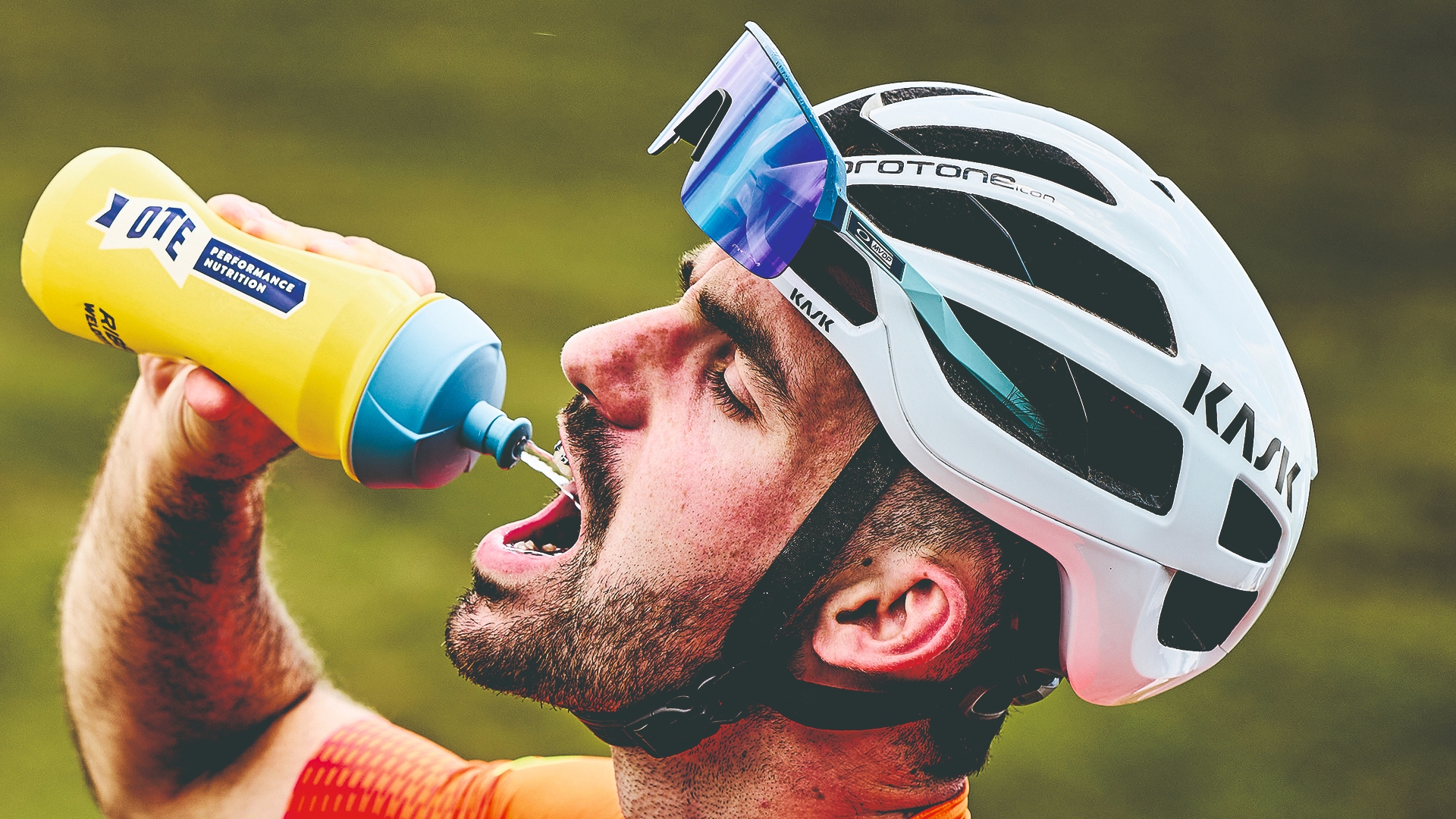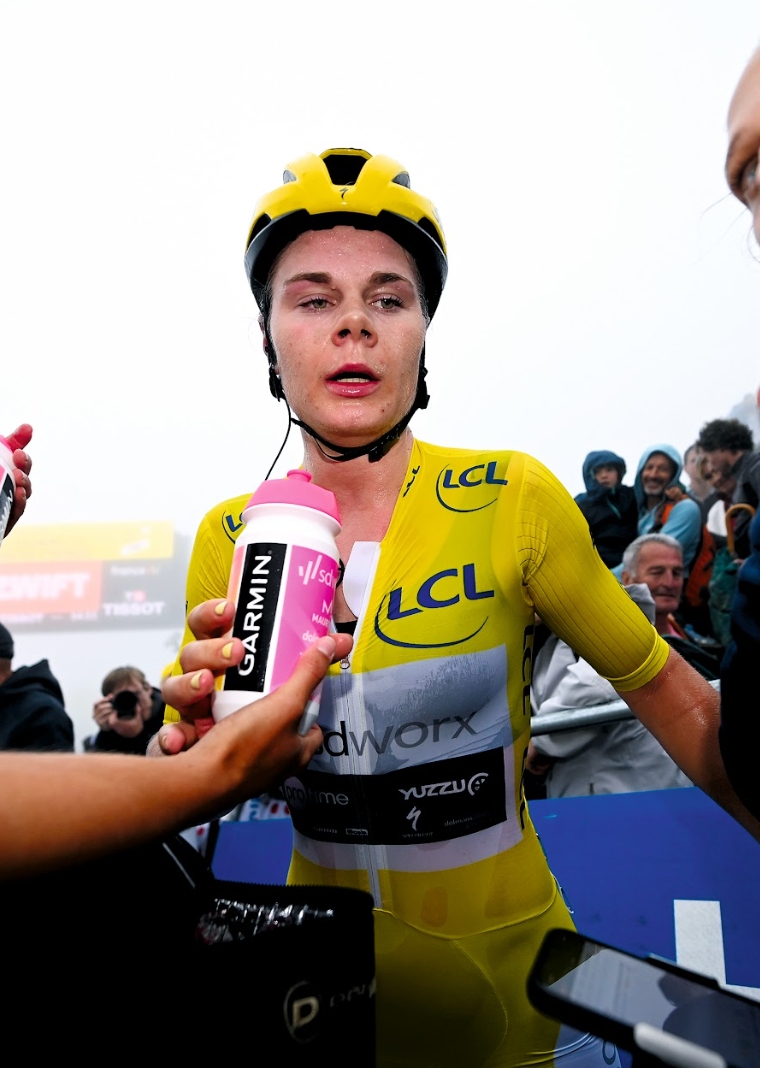Can a short term energy deficit make cyclists faster?
The body has an amazing ability to sustain performance even when it’s seriously short on energy. But does this mean deficits don’t matter? Anita Bean investigates


The latest race content, interviews, features, reviews and expert buying guides, direct to your inbox!
You are now subscribed
Your newsletter sign-up was successful
The Tour de France Femmes avec Zwift (TdFF) comprises eight stages across seven days. One of the biggest challenges riders face is fuelling the 946.3km journey, keeping pace with the expenditure of thousands of calories a day. Insufficient fuelling in a long race can spell disaster – or so cycling’s top scientists believed until very recently.
New research published in the International Journal of Sport Nutrition and Exercise Metabolism in May this year suggested that maintaining energy balance may not be as crucial as once thought, and that falling into a deficit could even improve performance. These surprise findings arose from a case study of a TdFF cyclist in the 2023 edition, which showed that despite ingesting large amounts of carbohydrate, she developed a severe energy deficit, losing 2.2kg in bodyweight over the eight-stage event. But remarkably her power output was highest in the last two stages of the race – despite the substantial deficit accrued in the days before.
These findings throw into question the assumption that cyclists need to maintain energy balance in a multi-stage race or hard training block. So let’s delve a little deeper into the concept of energy balance, the risks that energy deficit poses and what this means, at all levels of cycling, for both performance and long-term health.
Understanding energy balance
Simply put, energy balance is the calories consumed through eating and drinking (‘energy in’) versus those that are burned through physical activity, metabolic function and digestion (‘energy out’ or total daily energy expenditure). Too little ‘energy in’ results in a deficit and weight loss; too much results in a surplus and weight gain. When ‘energy in’ matches ‘energy out’, you’re in energy balance and your weight stays the same.
Maintaining energy balance does more than influence your weight. It is considered crucial during training or racing for minimising fatigue and injuries by supporting performance and recovery. It is also a basis on which to calculate appropriate carbohydrate intake, which is crucial for high-intensity exercise. Maintaining energy balance also ensures you have enough energy for essential functions, such as digestion, breathing, brain function and producing hormones, all critical for health and performance. Too few calories in can result in your metabolic processes and performance in training and competition being compromised.

Losing weight from hard training and racing affects both sexes differently, but not always in a negative way
A more complicated picture
Scientists at Liverpool John Moores University collaborating with the prestigious Pennington Biomedical Research Centre in Baton Rouge, Los Angeles, USA, have recently thrown this long-held theory into question. “Our studies have shown that athletes can maintain or improve their aerobic fitness and strength, at least in the short term, when they are in energy deficit,” explains Dr José Areta, lead author of the aforementioned study and lecturer in sports nutrition at Liverpool John Moores University. “Many athletes compete at an elite and world-class level despite showing clear signs of energy deficiency.”
Dr Areta’s latest study measured the daily energy expenditure and energy intake of one rider during the 2023 Tour de France Femmes. Notably, this was the first study to track a female rider’s energy output during a race using an isotope-based technique considered the reference standard method for measuring total daily energy expenditure in free-living athletes. The Tour de France Femmes is one of the toughest female endurance races in the world, with extremely high energy demands – consuming enough fuel can mean the difference between victory and defeat.
The latest race content, interviews, features, reviews and expert buying guides, direct to your inbox!
The researchers were surprised by the numbers. The unnamed rider’s daily energy output averaged 7,572kcal, among the highest individual values ever reported in a female athlete and comparable to values recorded by male cyclists during Grand Tours. Her energy intake ranged from 4,152 to 6,134kcal each day and did not come close to matching her calorie burn. In fact, she sustained an average daily energy deficit of 2,326kcal (or a 31% energy deficiency). This was further evidenced by a weight loss of 2.2kg over the eight-day race.
Surely disastrous for performance, you may think. But no – she actually maintained her performance and achieved a personal best time in the last stage of the race, going on to place 10th in the World championship time trial two weeks after the Tour.
“There is this idea that energy deficit is detrimental to performance, but our study provides further evidence that that may not be the case,” says Areta. “We can conclude that the relationship between energy balance and performance isn’t black and white. There is a fine line below which energy deficit isn’t detrimental to performance. It isn’t as clear-cut as once thought.”
To add to this, the athlete had shown signs of being in sub-par health. “Prior to the race, she showed signs of chronic energy deficiency, such as oligomenorrhea [irregular periods] and low T3 [an important metabolic hormone], yet she was still able to perform well at the highest international level.” Could it be that the weight loss aided her performance and so masked these problems?
“There is no clear evidence that dropping weight makes you a better cyclist,” says Areta. “Lighter may work for some cyclists but not for everyone. There is no one-size-fits-all. We need deficit, the scientist has a number of theories: “Firstly, I believe that her performance was likely unaffected because her carbohydrate intake was very high. While she accrued an energy deficit, she still had the fuel she needed to push hard.” Nevertheless, it’s impossible to say whether her performance would have been better had she not been in energy deficit and hadn’t lost weight.
Carbohydrate is, of course, vital for high-intensity efforts such as breakaways and tough climbs. The rider in Areta’s study consumed 9.7- 15.9g carbohydrate per kilo of body weight each day – consistent with the guidelines – which meant she was able to replenish glycogen between stages and perform well. Areta also offers an evolutionary explanation: “When facing limited energy availability, our bodies prioritise maintaining the physiological systems necessary for locomotion since this is important for acquiring food and for survival. It compensates by shutting down other biological functions such as growth and reproduction.”
In other words, physical capacity, despite being energetically expensive, is prioritised for allocation of limited resources – and is unlikely to be affected by energy deficiency unless key energy stores (like muscle glycogen) are critically low, or the deficit severe. Studies have also found that muscles adapt in response to an energy deficit to allow aerobic performance to be maintained.
Explanation and implications
The non-trivial weight gain experienced by Arensman and others may be explained by water retention and/or glycogen storage – each gram of glycogen is stored with around three grams of water. Retaining excess water can easily happen if a rider takes in too much sodium (for example, from electrolyte drinks) or as a response to the cellular damage wrought by three weeks of hard racing. When the body needs to repair, it holds on to more water. Whatever the cause, this weight gain did not appear to have negatively impacted Arensman’s performance – he ended the Giro in a respectable sixth place on GC.
As to how the female rider in Areta’s study managed to notch up a personal best performance despite an energy deficit, the scientist has a number of theories: “Firstly, I believe that her performance was likely unaffected because her carbohydrate intake was very high. While she accrued an energy deficit, she still had the fuel she needed to push hard.” Nevertheless, it’s impossible to say whether her performance would have been better had she not been in energy deficit and hadn’t lost weight.
Carbohydrate is, of course, vital for high-intensity efforts such as breakaways and tough climbs. The rider in Areta’s study consumed 9.7- 15.9g carbohydrate per kilo of body weight each day – consistent with the guidelines – which meant she was able to replenish glycogen between stages and perform well. Areta also offers an evolutionary explanation: “When facing limited energy availability, our bodies prioritise maintaining the physiological systems necessary for locomotion since this is important for acquiring food and for survival. It compensates by shutting down other biological functions such as growth and reproduction.”
In other words, physical capacity, despite being energetically expensive, is prioritised for allocation of limited resources – and is unlikely to be affected by energy deficiency unless key energy stores (like muscle glycogen) are critically low, or the deficit severe. Studies have also found that muscles adapt in response to an energy deficit to allow aerobic performance to be maintained.
Long-term effects

Gels and energy fuels can help to keep carbohydrate levels up
How to prevent under-fuelling
Avoid being in significant energy deficit for longer than three weeks. If you’re trying to lose weight, aim for a modest daily deficit of 300-600kcal, losing no more than 1kg per week.
Avoid continual or repeated periods of energy deficit, especially if you are already lean.
Try to match carb intake to daily activity levels to fuel both your body during training/racing and your brain.
Don’t avoid fat. Eating enough will help to maintain normal hormone levels.
Refuel with carbs and protein. Smoothies can be a great choice if your appetite is low after a ride.
Avoid excluding food groups for no good reason.
If you notice unintended weight loss, the IOC expert panel recommends increasing your calorie intake by 300-600kcal a day, depending on the size of your energy deficit, and implementing a weekly day off if you’re not already taking one. Any unexplained weight loss should be investigated by a GP.
While the cyclist in Areta’s study may have performed well despite under- fuelling and losing weight during the Tour, could a cyclist in energy deficit maintain his or her performance race after race? Might there not be longer-term costs? Renee McGregor, a sports dietitian specialising in relative energy deficiency in sport (RED-S), tells me: “In the initial stages, you may not see any negative effects on performance per se. However, energy deficit becomes problematic in the longer term. Most people are fine for roughly three weeks – but after that, being in energy deficit can lead to a rapid decrease in performance.” Problems may show up much later. “Cyclists come unstuck because they don’t appreciate that their behaviour six months or a year ago is the reason why they are not able to maintain performance today,” adds McGregor. For female cyclists, not having a regular menstrual cycle is a cause for concern, indicating that your normal hormone function has been disrupted. This may contribute to low bone- mineral density and increase your risk of stress fractures. “There are so many profound eff ects of chronic energy defi cit – on a cyclist’s hormones, health and performance,” explains McGregor. “If an energy deficit is maintained beyond three weeks and/or you are below the bodyweight you should be, it will start to have a negative eff ect on every process in the body – digestion, breathing, circulation, and even the immune system.”
Psychology is also aff ected: “It alters your ability to think clearly and rationally,” says McGregor. “Many of my clients associate a certain weight with success but fail to appreciate their performance was only short-term.”
Three-week window
Dr Areta’s study shows that it is possible to drop some weight and still perform at your best – at least in the short term. But there is a mismatch between sustained performance and imperilled health. There are potential negative effects of an energy deficit lasting more than three weeks – and health suffers before performance. Areta believes that males may be more resilient to the effects of energy deficit than females. In any case, the study highlights the need for further research with female athletes, which his team endeavour to conduct.
One thing is clear: proper fuelling with carbohydrates is vital for high- intensity performance. If you are doing a hard block of training, you need to avoid under-fuelling by being more proactive in planning your food. Pay attention to your energy levels, and make a sustained, conscious eff ort to consume enough energy – carbs in particular – even if you don’t have the appetite to particularly enjoy it.

Lotte Kopecky, leader during last year’s TdFF, refuels after stage seven
7 signs you might be under-fuelling
Not sleeping well - If you are having diffi culty sleeping despite being very tired, it may be your body’s signal that it needs more fuel.
Irregular periods - For reproductive-age women, having an irregular or non-existent menstrual cycle may indicate that your normal hormone function has been disrupted.
Frequent injuries or illnesses - Repeated injury or illness that lasts longer than three months and requires time off training can indicate low energy availability.
Mood swings and difficulty concentrating - A lack of fuel not only makes it hard to focus, but it can cause the levels of serotonin in your brain to fluctuate, making you prone to mood changes.
Digestive problems - If you under-eat, your digestive tract slows down, which can cause bloating, discomfort and constipation.
Drop in performance - You may experience an initial boost in performance when you’re under-fuelling but eventually you’ll experience a performance plateau or even deterioration.

Anita Bean is an award-winning registered nutritionist, internationally published author, health writer and former British bodybuilding champion. She specialises in sport and exercise nutrition and is passionate about helping athletes improve their performance in training and competition. She is the author of The Complete Guide to Sports Nutrition and The Vegan Athlete’s Cookbook and has written for Good Housekeeping, Waitrose Food and Women’s Running. Anita is also the nutritionist for RideLondon and the London Marathon. A strong advocate of an active lifestyle, Anita enjoys cycling, yoga, hiking and strength training.